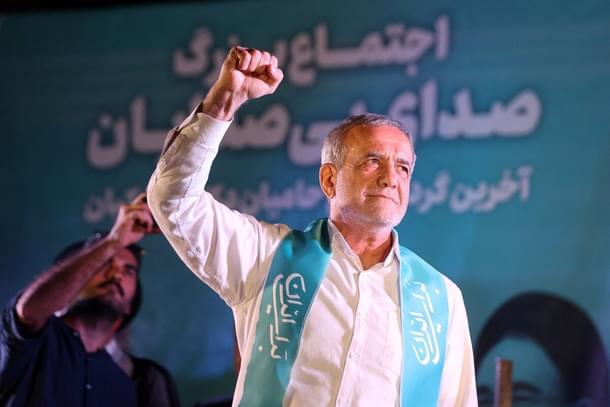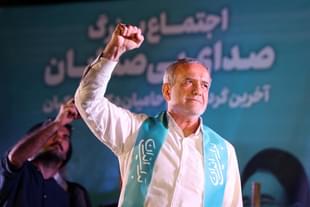World
Change In Iran Will Be Achingly Slow, If At All, Despite Election Of Moderate Masoud Pezeshkian
Ujjwal Shrotryia
Jul 09, 2024, 02:34 PM | Updated 02:25 PM IST
Save & read from anywhere!
Bookmark stories for easy access on any device or the Swarajya app.


Iran has elected a new, more moderate president, Masoud Pezeshkian.
The untimely election was held due to the death of Ibrahim Raisi in a helicopter crash in May.
Despite the more moderate turn at the top, any softening of Iran’s hardline policies against civil liberties and women's freedoms will be difficult and slow, if it happens at all.
During his campaign, Pezeshkian promised to liberalise various hardline policies and restrictions on the population of the Iranian state, including opposing moral police patrols, Gasht-e-Ershad, which force women to wear headscarves.
He promised to include more women and ethnic minorities, including the Kurds and Baluchis, in the government. He pledged to improve relations with the West, which, he said, would “get Iran out of its isolation.” He also sought to ease restrictions on internet access.
Further, he said he would try to revive the 2015 nuclear deal with the United States (US) to get rid of the sanctions. According to Pezeshkian, sanctions on Iran have wreaked havoc on its economy, and reaching out to Western nations will help strengthen it.
The president-elect had earlier asked for an investigation into Mahsa Amini’s death. She had died due to torture by the moral police for not wearing a headscarf, which led to widespread protests in 2022.
Pezeshkian's opposing candidate, Saeed Jalili, and the late Raisi both had a hardline orientation. Jalili even campaigned on doubling down on existing restrictions.
However, Pezeshkian's victory doesn't guarantee changes in Iranian policies. Even if they do come about, they will be slow and grinding.
The reason is that the real governing power in Iran is in the hands of their Supreme Leader, Ayatollah Ali Khamenei.
The country's military and the all-important Iranian Revolutionary Guard Corps (IRGC) are outside the ambit of the president's office.
Even the police, over which the president's office has some control, report to the Supreme Leader.
The president may have some control over economic policies and limited influence over domestic and foreign policy, but implementing any change in disregard of the Supreme Leader is out of the question.
He said so himself in his campaign speeches — Pezeshkian said he intends to avoid confrontation with the Supreme Leader and the IRGC.
Reformist presidents of the past, Mohammed Khatami, who was Pezeshkian’s mentor, and Hassan Rouhani, have failed to bring about change in Iran. Even 10 years of Rouhani’s rule were unable to usher in meaningful change.
Although Pezeshkian has batted for an investigation into the death of Amini and criticised the state’s move to quell the protests, it will be hard for him to implement the promised reforms.
He has limited jurisdiction over religious issues, over which the clergy enjoys complete sovereignty. As the hijab falls under religion, it is unlikely that he will be able to make a change.
It won't help Pezeshkian that the Iranian parliament is dominated by conservatives.
The Iranian population knows all this too well. It was reflected in the low voter turnout (only 40 per cent) in the first round of the election.
It was only after Pezeshkian won the first round with 42.5 per cent of votes, in excess of the 38.8 per cent of the hardliner Jalili, that the Iranians saw hope and came out to vote in larger numbers (more than 50 per cent) in the final round, handing Pezeshkian the win.
Despite knowing well about the tough, bumpy road ahead for him, the Iranian populace has reposed their confidence in Pezeshkian.
It will be keenly watched whether he can introduce any reforms or will instead be turned into another toothless president by the conservatives.
For now, Pezeshkian has sparked hope among the Iranian masses and delivered a message to the conservatives — make amends, or it won't be long before the legitimacy of the 1979 revolution is called into question.
Staff Writer at Swarajya. Writes on Indian Military and Defence.





